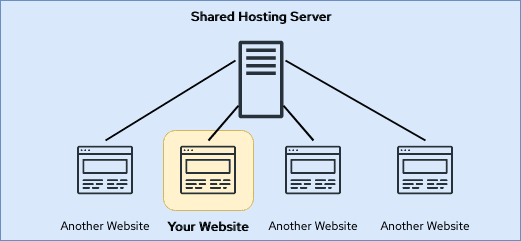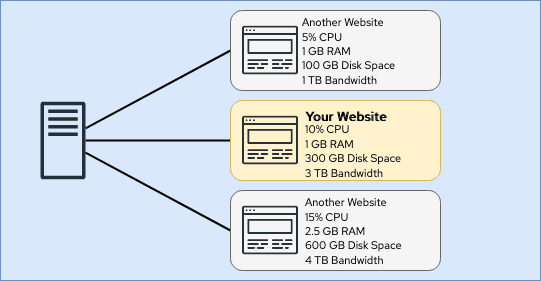When it comes to website hosting, there are several options available, each with its own set of advantages and disadvantages. One of the most popular options is shared hosting. In this blog post, we will explain what shared hosting is, how it works, and the pros and cons of using this hosting option.
What is Shared Hosting?
Shared hosting is a type of website hosting where multiple websites are hosted on a single server. The server’s resources, such as CPU, RAM, and storage, are shared among all the websites hosted on that server. This means that every website hosted on the server shares the same IP address and the same physical server resources.

When you sign up for a shared hosting plan, you will typically be given access to a control panel, such as cPanel, where you can manage your website, install applications, and make changes to your hosting account. Most shared hosting plans come with features such as email accounts, FTP access, and databases.
How Shared Hosting Works
When you sign up for a shared hosting plan, you will be given a portion of the server’s resources to use for your website. These resources include disk space, bandwidth, and CPU time. The amount of resources you get will depend on the hosting plan you choose.

Once you have signed up for a shared hosting plan, you will be given access to a control panel where you can manage your website. From the control panel, you can upload your website files, install applications, and create email accounts.
NodeSpace is responsible for maintaining the server and ensuring that it is running smoothly. This includes tasks such as installing software updates, monitoring server performance, and responding to any issues that arise.
Pros of Shared Hosting
- Cost-Effective: Shared hosting is one of the most affordable hosting options available. This is because the cost of the server and its resources is split among multiple users, making it a cost-effective option for those on a budget.
- Easy to Use: Shared hosting plans usually come with a user-friendly control panel that makes it easy to manage your website, even if you don’t have technical skills.
- Low Maintenance: Because the server is managed by the hosting provider, you don’t have to worry about maintaining the server or performing software updates. This means you can focus on running your website and growing your business.
- Scalability: Most shared hosting plans offer the option to upgrade your plan if your website needs more resources, making it easy to scale your website as your business grows.
Cons of Shared Hosting
- Limited Resources: Because resources are shared among multiple websites, you may experience slower website performance during peak traffic times or if another website on the same server is using too many resources.
- Security Risks: Shared hosting can be less secure than other hosting options because multiple websites are hosted on the same server. This means that if one website on the server is hacked, it could potentially affect all the other websites on the server.
- Less Control: Because the server is managed by the hosting provider, you have less control over the server’s configuration and software. This means you may not be able to install certain software or make changes to the server’s settings.
- Limited Customization: Shared hosting plans usually have limited customization options, which may not be suitable for websites that require more advanced configurations.
Is Shared Hosting Right for You?
Whether shared hosting is right for you depends on your specific needs and budget. Shared hosting is a good option for small businesses or individuals who are just starting and don’t need a lot of resources or advanced customization options.
However, if your website requires more resources or advanced configurations, you may want to consider other hosting options such as VPS hosting or dedicated hosting. These options offer more control and resources, but they are also more expensive than shared hosting.
Conclusion
In conclusion, shared hosting is a cost-effective and easy-to-use hosting option that is suitable for small businesses or individuals who are just starting. While it has its advantages, such as low cost and ease of use, it also has its disadvantages, such as limited resources and security risks.
Before choosing a hosting option, it’s important to consider your specific needs and budget. Shared hosting may be a good option for those on a tight budget or those who don’t need a lot of resources. However, if your website requires more resources or advanced configurations, you may want to consider other hosting options.



